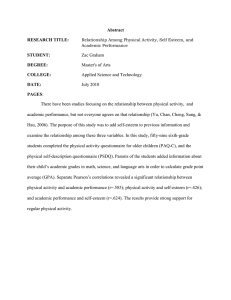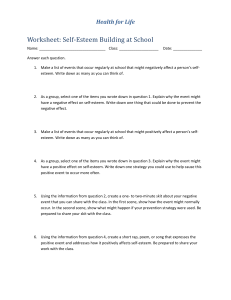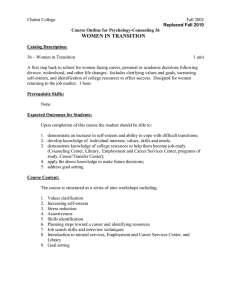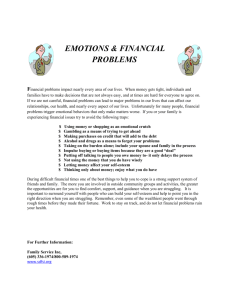Psychology 0f Personal Effectiveness Timothy W. Starkey, Ph.D., ABAP
advertisement
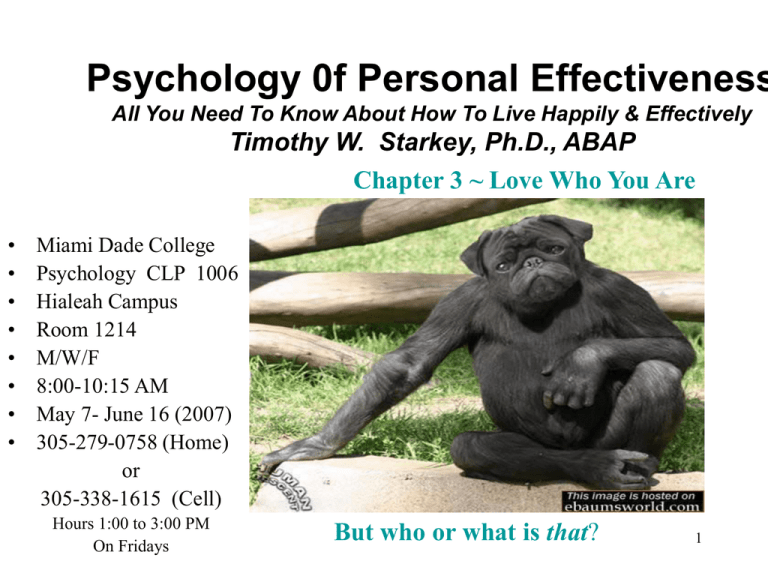
Psychology 0f Personal Effectiveness All You Need To Know About How To Live Happily & Effectively Timothy W. Starkey, Ph.D., ABAP Chapter 3 ~ Love Who You Are • • • • • • • • Miami Dade College Psychology CLP 1006 Hialeah Campus Room 1214 M/W/F 8:00-10:15 AM May 7- June 16 (2007) 305-279-0758 (Home) or 305-338-1615 (Cell) Hours 1:00 to 3:00 PM On Fridays But who or what is that? 1 Main Concepts in Chapter 3 • Concept of Self-Esteem • Self-Esteem Self Assessment • The Roots of Self-Esteem • Ways to Boost Your Self-Esteem • Common Unhealthy “Shoulds” Questionnaire 2 Self-Esteem • Self-esteem refers to the relationship you have with yourself, the degree to which you regard yourself in a positive or negative light. It is a part of your “self-concept”. • Your “self-concept” is a larger, broader perspective or set of beliefs about yourself; it is your paradigm about yourself. Selfesteem implies a judging or evaluating of self aspect that selfconcept does not. • “Ideal self” refers to the person that you feel you “should” be, and “real self” refers to the person you actually are. Obviously, determining “real self” can be largely a matter of opinion, and any individual could potentially have many different “real selves”, depending on whose opinions you used to determine his/her “real characteristics”. • Psychologists generally get around this dilemma in their studies by simply defining “real self” as what one’s friends and peers say one’s “real” characteristics are. See any problems with this? 3 4 The Meaning of Life 5 Self-Worth • OK, so “self-esteem” is based on your own appraisal of your good and bad qualities… your worth as a person. The result of this personal appraisal your sense of “self-worth”. • A person’s sense of “self-worth” can be based on a wide range of different characteristics… part of this is a matter of personal choice, and part of it is heavily influenced by cultural factors and the times in which one happens to life. • Behavioral scientists have found that major problems such as depression, drug abuse, and aggression may be linked not so much to our general level of self-esteem, but rather to the source of our self-esteem. • For example, teens who base their self-esteem on their athletic abilities or their good looks are setting themselves up for a crisis later on when the athletic skills fade (and society values them less) and their youthful good looks turn into middle average ordinariness. 6 • Well, you might ask… what else is there to base my sense of self-worth on, other than my incredible athletic abilities or my movie-star looks? • Anybody in class have some suggestions? • It is always better to have more than one source upon which to base your feelings of self-worth. In case one source goes sour on you (e.g. you sustain a crippling knee injury that keeps you out of athletics for the rest of your life), you always have one or more other sources to shift the importance (e.g. worth) to. • Many of us have formed a constant negative inner voice (“pathological critic”) that always judges us unfairly or unrealistically. We form this “pathological critic” during our early and middle childhood when we receive this type of evaluation (e.g. feedback) too often from our adult care-givers (e.g. parents, grandparents, aunts and uncles, older siblings) 7 8 Roots of Self-Esteem • Self-esteem has its roots both in genetics and in learning (e.g. environmental influences). Studies of identical twins reared apart, as well as studies comparing the personalities of adopted children with their biological and adoptive parents clearly reveal that our adult personalities are significantly influenced by our genetic makeup. Identical twins reared apart are more like each other in such traits as shyness, well-being, intelligence, anger, neuroticism, mania, and depression than are fraternal twins reared together. Also, adopted children are more similar as adults to their biological parents than to their adoptive parents in regards to these traits. Thus, there is no doubt that your genetic makeup does make a big contribution to your level of self-esteem. 9 Parental Influences on Self-Esteem • For most of us, though, parents are the most important influence in shaping or self-esteem, particularly in early life. If you were lucky enough to have been raised by parents who loved you and showed it, you will probably enjoy healthy self-esteem throughout your life. If your parents didn’t fit this category, however, developing a healthy, positive self-esteem is going to be a real struggle for you. It may still be possible, but you’re going to have to really work at it, and you may need professional counseling or therapy to accomplish it. • Carl Rogers (a Humanist psychologist) observed many years ago that children develop healthy self-esteem when parents show them unconditional positive regard (always accepting and loving the child, if not the behavior at a given moment). Conditional positive regard refers to judging the child’s worth on the basis of the acceptability of their behavior (at the time). What do you think of these ways of parenting? 10 Importance of Parental Confidence in Child 11 Parenting Styles (Baumrind) • Authoritarian - restrictive, punitive style of parenting, rigid rules, assumes child is incompetent • Authoritative - warm and nurturing, while still setting meaningful limits and controls for the child (and enforcing them through time-outs etc.) • Permissive/Indifferent - uninvolved in child’s life, provides the necessities of life but psychologically “aren’t there, aren’t particularly harsh or punitive • Permissive/Indulgent - very involved in child’s life and often very loving, do not set meaningful limits or don’t enforce them, often spoil the child, often don’t require child to “earn” any rewards 12 ~ How to Boost Your Self-Esteem ~ Or How To Attack The “Shuddas” • Many people believe that their “ideal self” is something that they “should be” and then feel disappointed with themselves when they fail to reach this goal. They tend to always place their “ideal self” just a few inches beyond their reach, and hence always fall short of their goals. • In order to build a healthy self-esteem, we need to set realistic goals that are possible for us to achieve; after we have achieved them, we can “raise the bar” a little and set our goals a little higher the next time (if we wish). • Many of us have developed “irrational beliefs” about what the “ideal self” ought to be. When we try to measure ourselves against an irrationally perfect “ideal self”, we can only end up feeling inferior. 13 14 End of Chapter 3 15
